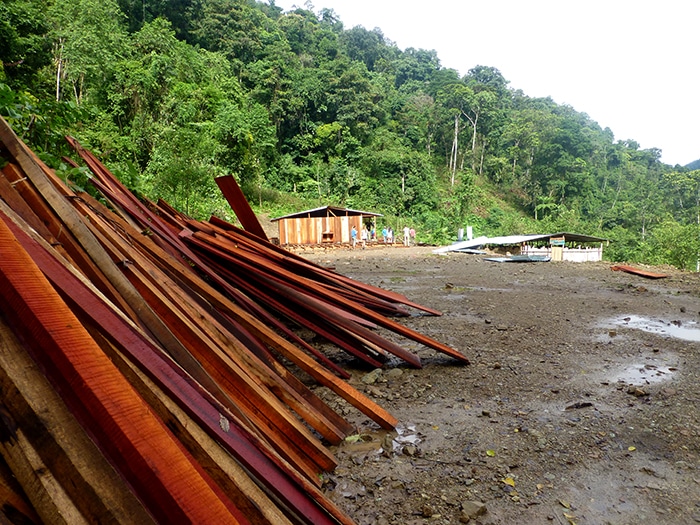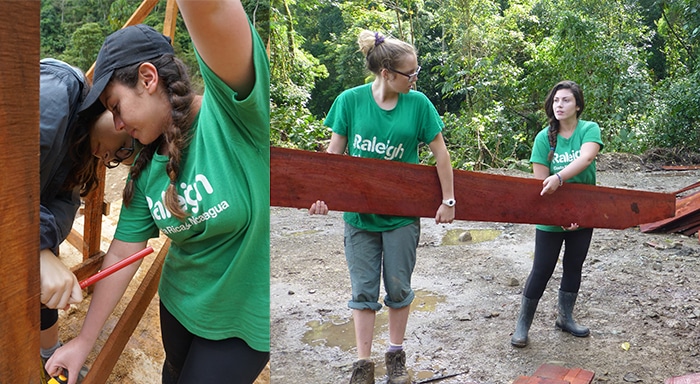International Youth Day 2018 - Speak Through Humanity
Home | Costa Rica |
International Youth Day 2018: “Even Though We are Working with very Different People, with Different Cultures and Different Languages, We Understand Each Other.”
English
Why are ‘safe spaces’ important?
A ‘safe space’ can be referring to a physical place such as a civic space, enabling young people to engage with government, or a public space giving them the opportunity to participate in their community. It can also include digital spaces, which help young people interact virtually. These spaces should enable young people to feel comfortable expressing themselves and contributing to society. However, these spaces are too often missing, particularly in developing countries.
Raleigh works to provide safe spaces that are inclusive, with young volunteers from diverse backgrounds and cultures designing, implementing and evaluating our work. With Raleigh, volunteers from across the world can learn from each other and grow in an environment in which they feel safe. They can then go on to take the skills they’ve learnt back home to help involve other young people in their own communities as active citizens.
All our programmes include an element of youth leadership, encouraging our volunteers to develop the key skills and knowledge needed to tackle issues and create positive change.
How volunteers are creating safe spaces for other young people

Raleigh projects are always based on the need of the communities we work with. This summer, we are running community resilience projects in the Alto Chirripó Indigenous Territory of Costa Rica. The aim is to improve educational facilities for the communities living here. This territory is one of the most remote areas in the country and one of the key barriers to development in the community is lack of quality education. The average number of years spent in school is 3.4, with only 9.1% of students going on to attend secondary school.

Raleigh volunteers in the indigenous community of Uluk Kicha have been working alongside community members to build new a secondary school with five classrooms. This will ensure that the young people in the community have a safe space to learn and reach their full potential.

Young volunteers working side-by-side for change
On all Raleigh programmes, volunteer teams are made up of young people from a wide range of backgrounds and nationalities, including from the country where the project is taking place. This mix is crucial to the success of the programmes. Young people share their cultures and differing perspectives on the world, learning and growing together as the project develops.
Joselyn, from Cartago in Costa Rica, is one of the volunteers helping build the school in Uluk Kicha. When asked about her experience working with international volunteers and those from her own country, Joselyn replied:
“Because you are from another country or place, you might think that we are really different from each other, but we are not. Even though we are working with very different people, with different cultures and different languages, we understand each other.”

Also working in this group is Giovani from Managua, Nicaragua. Giovani has a long-standing interest in the history of the indigenous people. When asked about what it is like working in a team of volunteers from around the world, Giovani said: “I’ve always believed that we should not generalise, it is important to learn about their lives of people from different cultures and they can learn about yours at the same time. At the end of the day, we are like a family.”

Joselyn and Giovani’s experiences on Expedition have already had a positive impact on their aspirations for the future. Joselyn hopes that her time with Raleigh will spark the beginning of a career in sustainable development and Giovani is keen to return to volunteer with Raleigh as a Project Manager.
What’s clear is that everyone benefits when young people from all over the world have a chance to contribute to development. Without their drive, commitment and passion it will be impossible to achieve the UN’s Global Goals and create a more sustainable and inclusive world for all.
Celebrate International Youth Day with us! If you have volunteered with us in Costa Rica or Nicaragua, let us know on Facebook, Twitter or Instagram at @RaleighInternational.
Words and photographs by Communications Officer Helen Kidwell.
Español
¿Por qué son importantes los “espacios seguros”?
Un ‘espacio seguro’ puede referirse a un lugar físico como un espacio cívico, que permite a los jóvenes relacionarse con el gobierno, o un espacio público que les da la oportunidad de participar en su comunidad. También puede incluir espacios digitales, que ayudan a los jóvenes a interactuar de forma virtual. Estos espacios deberían permitir que los jóvenes se sientan cómodos expresándose y contribuyendo a la sociedad. Sin embargo, estos espacios a menudo faltan, especialmente en los países en desarrollo.
Raleigh trabaja para proporcionar espacios seguros que sean inclusivos, con jóvenes voluntarios de diversos orígenes y culturas diseñando, implementando y evaluando nuestro trabajo. Con Raleigh, voluntarios de todo el mundo pueden aprender unos de otros y crecer en un entorno en el que se sientan seguros. Luego pueden adquirir las habilidades que aprendieron en su país para ayudar a involucrar a otros jóvenes en sus propias comunidades como ciudadanos activos.
Todos nuestros programas incluyen un elemento de liderazgo juvenil, alentando a nuestros voluntarios a desarrollar las habilidades clave y los conocimientos necesarios para abordar los problemas y crear un cambio positivo.
Cómo los voluntarios están creando espacios seguros para otros jóvenes

Los proyectos de Raleigh siempre se basan en la necesidad de las comunidades con las que trabajamos. Este verano, estamos ejecutando proyectos de resiliencia comunitaria en el Territorio Indígena Alto Chirripó de Costa Rica. El objetivo es mejorar las instalaciones educativas para las comunidades que viven aquí. Este territorio es una de las áreas más remotas del país y una de las principales barreras para el desarrollo en la comunidad es la falta de educación de calidad. La cantidad promedio de años que se pasan en la escuela es de 3,4, y solo el 9,1% de los estudiantes asisten a la escuela secundaria.

Los voluntarios de Raleigh en la comunidad indígena de Uluk Kicha han estado trabajando junto a los miembros de la comunidad para construir una nueva escuela secundaria con cinco aulas. Esto asegurará que los jóvenes de la comunidad tengan un espacio seguro para aprender y alcanzar su máximo potencial.

Jóvenes voluntarios que trabajan codo a codo para el cambio
En todos los programas de Raleigh, los equipos de voluntarios están formados por jóvenes de una amplia gama de orígenes y nacionalidades, incluso del país donde se desarrolla el proyecto. Esta mezcla es crucial para el éxito de los programas. Los jóvenes comparten sus culturas y perspectivas diferentes sobre el mundo, aprendiendo y creciendo juntos a medida que el proyecto se desarrolla.
Joselyn, de Cartago en Costa Rica, es una de las voluntarias que ayuda a construir la escuela en Uluk Kicha. Cuando se le preguntó sobre su experiencia trabajando con voluntarios internacionales y los de su propio país, Joselyn respondió:
“Debido a que eres de otro país o lugar, puedes pensar que somos realmente diferentes el uno del otro, pero no lo somos. Aunque trabajamos con personas muy diferentes, con diferentes culturas y diferentes idiomas, nos entendemos.”

También trabaja en este grupo Giovani de Managua, Nicaragua. Giovani tiene un interés de larga data en la historia de los pueblos indígenas. Cuando se le preguntó sobre cómo es trabajar en un equipo de voluntarios de todo el mundo, Giovani dijo: “Siempre he creído que no debemos generalizar, es importante aprender sobre sus vidas de personas de diferentes culturas y pueden aprender sobre el suyo al mismo tiempo. Al final del día, somos como una familia.”

Las experiencias de Joselyn y Giovani en Expedición ya han tenido un impacto positivo en sus aspiraciones para el futuro. Joselyn espera que su tiempo con Raleigh active el comienzo de una carrera en el desarrollo sostenible y Giovani desea volver a ser voluntario con Raleigh como Gerente de Proyecto.
Lo que está claro es que todos se benefician cuando los jóvenes de todo el mundo tienen la oportunidad de contribuir al desarrollo. Sin su impulso, compromiso y pasión, será imposible alcanzar los Objetivos Globales de la ONU y crear un mundo más sostenible e inclusivo para todos.
¡Celebra el Día Internacional de la Juventud con nosotros! Si se ha ofrecido como voluntario en Costa Rica o Nicaragua, avísenos en Facebook, Twitter o Instagram en @RaleighInternational.
Palabras y fotografías de la Oficial de Comunicaciones Helen Kidwell.
Interested in doing an Expedition yourself?
Explore our Expedition resources
Hear directly from Raleigh alumni and get your questions answered.
You’ll find everything in one place about our Expeditions.
Send us an enquiry with what you’d like to know more about.



